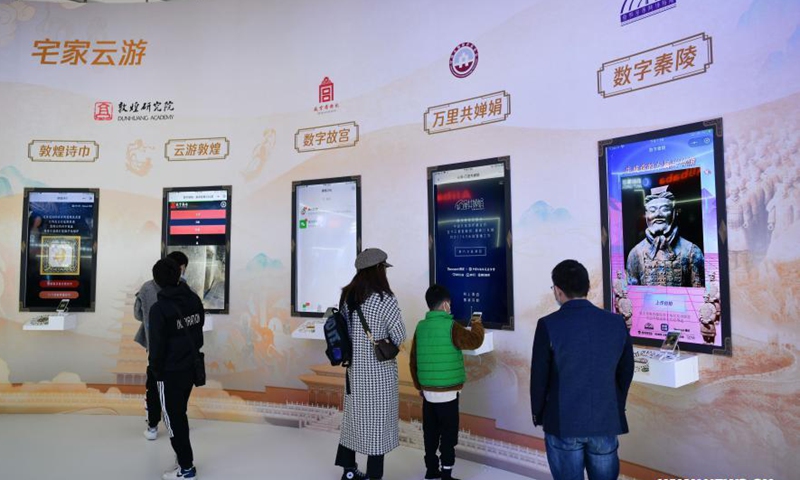China builds world’s largest internet test facility backbone network
Infrastructure breakthrough to ensure communications security, stability

People try out cloud tourism devices at the booth of Tencent during the Light of Internet Expo of the 2020 World Internet Conference (WIC) in Wuzhen, east China's Zhejiang Province, Nov. 22, 2020. The expo focuses on the world's most recent internet development trends and cutting-edge technologies, showcasing the latest internet technologies, achievements, products and applications of 130 enterprises and institutions from home and abroad. (Xinhua/Li Xin)
China announced on Tuesday that it has opened the world's largest internet test facility backbone network, a move that analysts said will push the development of next-generation innovations mapped out in China's blueprint for the next five years, while ensuring the country's internet stability and security, while ending reliance on the US.
A ceremony was held at Beijing's Tsinghua University to open the high-performance backbone of the Future Internet Test Infrastructure (FITI), the world's largest internet test facility, which is also China's first major science and technology infrastructure project in the information field at the national level, the Xinhua News Agency reported Tuesday.
Powered by FITI, the number of Internet Protocol version 6 (IPv6) addresses owned by China has jumped to the No.1 ranking in the world in early April, the Xinhua report said.
IPv6 is the most recent version of the Internet Protocol (IP), communications protocol that provides an identification and location system for computers on network and route traffic. It allows much higher theoretical limits on the number of IP addresses than the IPv4 system.
The FITI backbone core nodes are located in 31 Chinese provincial-level regions with 200G of bandwidth between the core nodes. At the meantime, it supports 4,096 large-scale trial networks, achieving interconnection with domestic and international IPv4/IPv6 trial facilities, according to Xinhua.
FITI is significant for the development of next-generation technologies like artificial intelligence (AI), 5G and autonomous driving, Liu Gang, chief economist with the Chinese Institute of New Generation Artificial Intelligence Development Strategies, told the Global Times on Tuesday.
"Featuring faster transmission speed and lower latency, the FITI can better accommodate real-time data transmission required by AI," Liu said.
He said that a typical use scenario is coordination of autonomous driving technology and mobile internet in China to more precisely locate surrounding information, which will help smart city buildup.
The new infrastructure will boost the integration of new technologies and every aspect of economic and social life - which is the direction and main battleground of the fourth industrial revolution, Liu said, noting that it will not only spark a new wave of technological innovation but also boost productivity.
Liu said that expansion of mobile internet has boosted productivity in the vast rural areas, with 22 new types of jobs having emerged in villages. "FITI will undoubtedly bring monumental changes to China."
For China, IPv6 is a tough battle that it cannot afford to lose, and it is the key to preserving the economic foundation and industrial advantages of the internet. For the future, IPv6 is just the starting point of an eye-catching blitz, industry observers said.
Ma Jihua, a Beijing-based industry analyst, told the Global Times on Tuesday that the major internet companies support IPv6, and China is making big moves in this regard.
"The essence of this launch on Tuesday is to ensure the security and stability of China's internet," said Ma, noting that the test facility network that China is opening is completely independent in terms of addresses and core nodes.
"In other words, with IPv6, we won't have to rely on IPv4 from the US for server resolution," said Ma. The backbone network will also ensure that China has more say in the next generation of 5G networks, Ma added.
As of December 2020, the number of internet users in China had reached 989 million, an increase of 85.4 million from March 2020, and the internet penetration rate hit 70.4 percent.
In the world's digital economy race, China and the US are the two largest players. The digital economy of the US accounts for two-thirds of its GDP, taking the lead. China comes second with its digital economy scale making up 36.2 percent of economic output in 2019.
The fast development of China's internet economy means that the country must seize the opportunity in the era of IPv6, the next-generation internet, to build an independent infrastructure instead of being at the mercy of the US in the existing IPv4 era, observers said.
China issued a plan to encourage large-scale adoption of the IPv6 network in 2017. According to the plan, by the end of 2025, network and terminal devices will fully support the adoption of IPv6 in China, and it will have the largest number of IPv6 users in the world.


